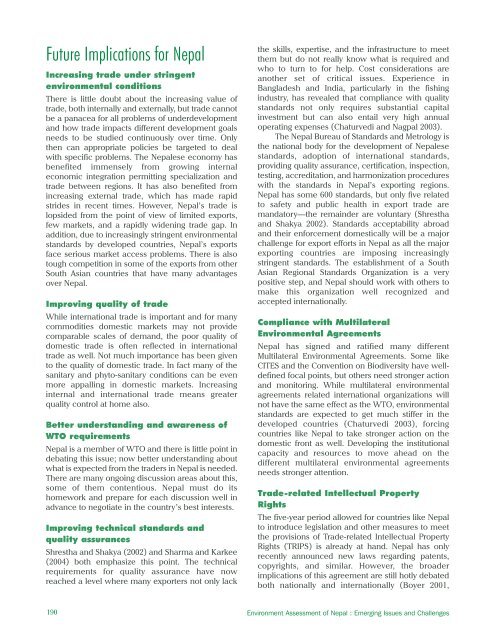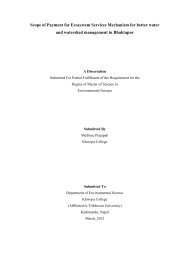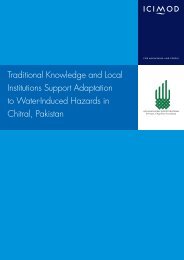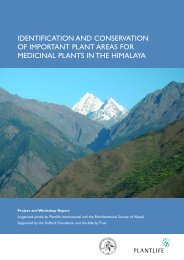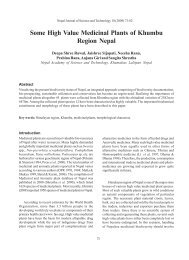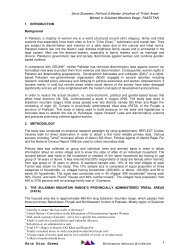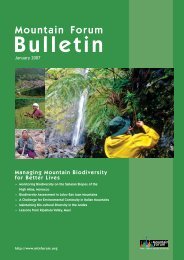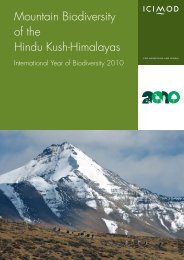Future Implications for NepalIncreasing trade under stringentenvironmental conditionsThere is little doubt about the increasing value oftrade, both internally and externally, but trade cannotbe a panacea for all problems of underdevelopmentand how trade impacts different development goalsneeds to be studied continuously over time. Onlythen can appropriate policies be targeted to dealwith specific problems. The Nepalese economy hasbenefited immensely from growing internaleconomic integration permitting specialization andtrade between regions. It has also benefited fromincreasing external trade, which has made rapidstrides in recent times. However, Nepal’s trade islopsided from the point of view of limited exports,few markets, and a rapidly widening trade gap. Inaddition, due to increasingly stringent environmentalstandards by developed countries, Nepal’s exportsface serious market access problems. There is alsotough competition in some of the exports from otherSouth Asian countries that have many advantagesover Nepal.Improving quality of tradeWhile international trade is important and for manycommodities domestic markets may not providecomparable scales of demand, the poor quality ofdomestic trade is often reflected in internationaltrade as well. Not much importance has been givento the quality of domestic trade. In fact many of thesanitary and phyto-sanitary conditions can be evenmore appalling in domestic markets. Increasinginternal and international trade means greaterquality control at home also.Better understanding and awareness ofWTO requirementsNepal is a member of WTO and there is little point indebating this issue; now better understanding aboutwhat is expected from the traders in Nepal is needed.There are many ongoing discussion areas about this,some of them contentious. Nepal must do itshomework and prepare for each discussion well inadvance to negotiate in the country’s best interests.Improving technical standards andquality assurancesShrestha and Shakya (2002) and Sharma and Karkee(2004) both emphasize this point. The technicalrequirements for quality assurance have nowreached a level where many exporters not only lackthe skills, expertise, and the infrastructure to meetthem but do not really know what is required andwho to turn to for help. Cost considerations areanother set of critical issues. Experience inBangladesh and India, particularly in the fishingindustry, has revealed that compliance with qualitystandards not only requires substantial capitalinvestment but can also entail very high annualoperating expenses (Chaturvedi and Nagpal 2003).The Nepal Bureau of Standards and Metrology isthe national body for the development of Nepalesestandards, adoption of international standards,providing quality assurance, certification, inspection,testing, accreditation, and harmonization procedureswith the standards in Nepal’s exporting regions.Nepal has some 600 standards, but only five relatedto safety and public health in export trade aremandatory—the remainder are voluntary (Shresthaand Shakya 2002). Standards acceptability abroadand their enforcement domestically will be a majorchallenge for export efforts in Nepal as all the majorexporting countries are imposing increasinglystringent standards. The establishment of a SouthAsian Regional Standards Organization is a verypositive step, and Nepal should work with others tomake this organization well recognized andaccepted internationally.Compliance with MultilateralEnvironmental AgreementsNepal has signed and ratified many differentMultilateral Environmental Agreements. Some likeCITES and the Convention on Biodiversity have welldefinedfocal points, but others need stronger actionand monitoring. While multilateral environmentalagreements related international organizations willnot have the same effect as the WTO, environmentalstandards are expected to get much stiffer in thedeveloped countries (Chaturvedi 2003), forcingcountries like Nepal to take stronger action on thedomestic front as well. Developing the institutionalcapacity and resources to move ahead on thedifferent multilateral environmental agreementsneeds stronger attention.Trade-related Intellectual PropertyRightsThe five-year period allowed for countries like Nepalto introduce legislation and other measures to meetthe provisions of Trade-related Intellectual PropertyRights (TRIPS) is already at hand. Nepal has onlyrecently announced new laws regarding patents,copyrights, and similar. However, the broaderimplications of this agreement are still hotly debatedboth nationally and internationally (Boyer 2001,190 Environment Assessment of Nepal : Emerging Issues and Challenges
Chaturvedi 2003, Adhikari 2004). The long-termimpacts on national biodiversity, genetic pool, localfood security, and protection of local innovation andtraditional knowledge are still being discussed. Withthe collapse of American leadership on internationalenvironmental issues, Europe now leads inpromoting new environmental standards (Boyer2001) and it is not clear how this will proceed.Adequate capacity and resources for research,analysis, information, local registration, andmaintaining a local registry are important practicalaspects for the future. This subject is still developing,and Nepal must do a significant amount ofhomework as it shares a common endowment andheritage in genetic resources, medical tradition, andagricultural practices with many South Asiancountries.Trade Environment SurveillanceWe know very little about the complex relationshipbetween trade and environment. Interest in thissubject grew only after the WTO agreement, whichmade it necessary to improve understanding of thetechnical aspects of trade and environment.Ignorance in this respect can be very costly in termsof the loss of export markets. Understandingdomestic trade and its environmental aspects alsoneeds to be significantly improved. In the long runthe need to improve domestic standards is veryapparent, especially regarding agricultural products.Nepal is a signatory to many different types of tradingregimes—bilateral, regional, and international. It isnot yet clear how each of these arrangements isserving the interests of the nation and what impacteach has on the environment. Unless trade andenvironment are closely monitored in their differentsettings, our capacity to negotiate better economicand environmental deals may be severelycompromised in the future.BibliographyAdhikari, D.R. 2004. “From Pollution to Responsibility.” InThe Kathmandu Post. 6 June. EnvironmentKathmandu.Available:http://www.environmentnepal.com.np/articles_d.asp?id=255Adhikari, R. 2004. “TRIPS Agreement: Implications forBiodiversity and Poverty in Nepal.” Kathmandu:South Asia Watch on Trade, Economics andEnvironment (SAWTEE)Ahmed, S., and Z. Sattar. 2004. “Impact of TradeLiberalization: Looking at the Evidence.” Economicand Political Weekly, 39(36): 4059–67.Andrew, D., K. Dahou, and R. Steenblik. 2004. “AddressingMarket Access Concerns of Developing CountriesArising From Environmental and HealthRequirements: Lessons From National Experiences.”OECD Trade Policy Working Paper, No. 5, Paris:Organisation for Economic Co-operation andDevelopment (OECD). Available:http://webdomino1.oecd.org/olis/ 2003doc.nsf/43bb6130e5e86e5fc12569fa005d004c/028bb89ef4f06073c1256f19003c65dd/$FILE/JT00169927.PDFBanskota, M. 2005. “Sustainable Human Development.” InThe Environmental Perspective: General Overviewand Nepal’s Experience. Paper prepared for UnitedNations Development Programme Nepal.Bardhan, P. 2001. “Social Justice in the Global Economy.”Economic and Political Weekly 36(5 and 6): 467–480.Bhagawati, J. 2001. “Growth, Poverty and Reforms.”Economic and Political Weekly 36(16): 843–846.Boyer, D. 2001. “Trade: The Connection BetweenEnvironment and Sustainable Livelihoods.” WorkingPaper, No. 5, Oxfam America, Boston. Available:http://www.oxfamamerica.org/newsandpublications/publications/ideas_at_oxfam/art5071.html/?searchterm=working%20paper%205Busse, M. 2004. “Trade Environment Regulation and theWorld Trade Organisation.” World Bank PolicyResearch Working Paper, 3361. Washington, DC: TheWorld Bank.Clean Energy Nepal (CEN), and Environment and PublicHealth Organisation (ENPHO). 2003. Health Impactsof Kathmandu’s Air Pollution. Kathmandu.Chaturvedi, S., and G. Nagpal. 2003. “WTO and Product-Related Environmental Standards: Emerging Issuesand Policy Options.” Economic and Political Weekly38(1): 66–74.Chaturvedi, S. 2003. “Agricultural Biotechnology andEmerging Trade Regime at WTO: Some Issues ofConcern.” In Trade and Biodiversity, edited by P.Balakrishna, and E. Warner, Colombo: The WorldConservation Union (IUCN), Regional BiodiversityProgramme, Asia.Consumer Unity & Trust Society (CUTS). 1999. “Trade andEnvironment—An Agenda for DevelopingCountries.” Briefing Paper No. 2, CUTS <strong>Centre</strong> forInternational Trade, Economics and Environment,Jaipur. Available: http://www.cuts-international.org/no2-99.pdfDhakal, S. 2003. “Air Pollution—Suffocating City.” SpotlightVol. 22 No. 25, January 03–09. Kathmandu. Available:http://www.environmentnepal.com.np/articles_d.asp?id=91Dhakal, S. 2004. “Biodiversity for Security.” In Spotlight,24(17). Available: http://www.nepalnews. com.np/contents/englishweekly/spotlight/2004/nov/nov26/national3.htmFederation of Nepalese Chambers of Commerce andIndustry (FNCCI). 2004. Nepal and the World: AStatistical Profile 2004. Kathmandu.Chapter 12: Environment and Trade191
- Page 2 and 3:
About the OrganisationsAsian Develo
- Page 4 and 5:
© 2006 International Centre for In
- Page 6 and 7:
AcknowledgementsWe would like to ex
- Page 8 and 9:
PM2.5PAHRSSAARCSACEPSEASO 2TSPUKUND
- Page 10 and 11:
Chapter 6: Energy Resources 65Intro
- Page 12 and 13:
List of FiguresFigure 2.1: People a
- Page 14 and 15:
Table 6.1: Energy Consumption and P
- Page 16 and 17:
forests are also used for infrastru
- Page 18 and 19:
as data gathered by different agenc
- Page 20 and 21:
Table 2.1: Population Growth Rates
- Page 22 and 23:
mortality rates for rural and urban
- Page 24 and 25:
Agglomeration village in the centra
- Page 26 and 27:
soil erosion, and depletion of wate
- Page 30 and 31:
provision remains inadequate becaus
- Page 32 and 33:
Malnutrition remains a serious obst
- Page 34 and 35:
Table 2.24: Existing and Projected
- Page 36 and 37:
Table 2.28: Income Poverty Indicato
- Page 38 and 39:
Table 2.31: Change in Employment St
- Page 40 and 41:
In 2004, the average annual househo
- Page 42 and 43:
Mountain areas have the most food i
- Page 44 and 45:
Schaffner, U. 1987. “Road Constru
- Page 46 and 47:
Table 3.1: Agricultural Economic De
- Page 48 and 49:
Table 3.4: Estimated Soil Erosion R
- Page 50 and 51:
B. PradhanImpacts of land degradati
- Page 52 and 53:
Carson, B. 1985. “Erosion and Sed
- Page 54 and 55:
The trend of forest coverage in the
- Page 56 and 57:
BiodiversityState of BiodiversityNe
- Page 58 and 59:
The Government has given legal prot
- Page 60 and 61:
Different ways of maintaining biodi
- Page 62 and 63:
———.2004. State of the Enviro
- Page 64 and 65:
Appendix 4.1: Table continuedMajor
- Page 66 and 67:
Appendix 4.2: Protected Plant and W
- Page 68 and 69:
Table A4.2.3: Nepal's Share in Plan
- Page 70 and 71:
to intense weathering, and percolat
- Page 72 and 73:
Table 5.5: Water Supply and Water T
- Page 74 and 75:
Table 5.9: Water Quality of Shallow
- Page 76 and 77:
species are reported to be endanger
- Page 78 and 79:
Ministry of Water Resources (MOWR).
- Page 80 and 81:
Definition, Forms, and UnitsEnergy
- Page 82 and 83:
Table 6.5: Hydropower PotentialRive
- Page 84 and 85:
Chilime Hydroelectric Project: An E
- Page 86 and 87:
load occurs from 6 pm to 9 pm with
- Page 88 and 89:
assessment of wind energy and lack
- Page 90 and 91:
Review of Dams and Development by t
- Page 92 and 93:
IUCNElizabeth Khaka, UNEP-NairobiRu
- Page 94 and 95:
therefore reflect the three guiding
- Page 96 and 97:
is a seasonal dust storm. Anthropog
- Page 98 and 99:
Figure 7.3: Average Air Quality, Ja
- Page 100 and 101:
matter, hydrocarbons, and NO x (Nae
- Page 102 and 103:
Figure: 7.9: Vehicle Registered in
- Page 104 and 105:
Brick Kilnchlorofluorocarbons (HCFC
- Page 106 and 107:
Climate ChangeA region’s climate
- Page 108 and 109:
Figure 7.14: Mean Annual Precipitat
- Page 110 and 111:
Table 7.3: National Ambient Air Qua
- Page 112 and 113:
India. Available: http://www.cleana
- Page 114 and 115:
———.1999. “Ambient Air Qual
- Page 116 and 117:
Appendix 7.1: World Health Organiza
- Page 118 and 119:
Table 8.1: Criteria for Urban Statu
- Page 120 and 121:
accommodate the rapidly increasing
- Page 122 and 123:
managing solid waste. They are part
- Page 124 and 125:
In most municipalities, hazardous w
- Page 126 and 127:
in worsening public health conditio
- Page 128 and 129:
objects of archaeological, historic
- Page 130 and 131:
Min BajracharyaB. PradhanVehicles a
- Page 132 and 133:
Department of Health Services (DOHS
- Page 134 and 135:
Table 9.1 describes the major highl
- Page 136 and 137:
the period to up 2017. The document
- Page 138 and 139:
earthquakes; and awareness raising
- Page 140 and 141:
Sub-regional LinkagesOther developi
- Page 142 and 143:
Figure 9.1: The Key Environmental I
- Page 144 and 145:
(iv)(v)(vi)plants, and other non-ti
- Page 146 and 147:
environmental governance can be bet
- Page 148 and 149:
can vary considerably. Both sides h
- Page 150 and 151:
Dhungel, D.N., and A.B. Rajbhandari
- Page 152 and 153:
Table A9.1.2: Industry-Specific Tol
- Page 154 and 155: . Cultural Heritage8. Convention fo
- Page 156 and 157: Appendix 9.3: Some Prominent Enviro
- Page 158 and 159: Some funding arrangements made by t
- Page 160 and 161: (NARDF 2004) for a period of 1 to 3
- Page 162 and 163: Table 10.2: Annual Income and Expen
- Page 164 and 165: Table 10.4: Users’ Share in Benef
- Page 166 and 167: From Hands Around Everest bookFrom
- Page 168 and 169: Table 10.8: Subsidy Rate for Biogas
- Page 170 and 171: microorganism communities and the n
- Page 172 and 173: subsidies (Mason 1996). All these a
- Page 174 and 175: addressed only part of the problem.
- Page 176 and 177: historical practice of community-ma
- Page 178 and 179: moved or relocated. The fact that s
- Page 180 and 181: Kathmandu Valley and receives a lar
- Page 182 and 183: cooperative ventures provided neith
- Page 184 and 185: further poaching has not been repor
- Page 186 and 187: http://www.pugwash.org/reports/pac/
- Page 188 and 189: United Nations. 2003. World Populat
- Page 190 and 191: how other countries with substantia
- Page 192 and 193: (i) Broad-based and sustainable eco
- Page 194 and 195: Although progress is encouraging, m
- Page 196 and 197: Nepal’s Changing Pattern of Trade
- Page 198 and 199: Table 12.2: Trade/ GDP RatiosFY1981
- Page 200 and 201: Table 12.5: Percentage Share of Maj
- Page 202 and 203: well as other provisions in specifi
- Page 206 and 207: International Trade Forum (ITN). 20
- Page 208 and 209: - Gross domestic product per unit e
- Page 210 and 211: Time Series InformationGenerally tw
- Page 212 and 213: Table 13.1a: Different Datasets Col
- Page 214 and 215: elevant due to its multidisciplinar
- Page 216 and 217: Figure 13.6: Examples of Applicatio
- Page 218 and 219: Judith DobmannThere are many source
- Page 220 and 221: ———.2003. Mapping Nepal Censu
- Page 222 and 223: sustainable livelihoods requires an
- Page 224 and 225: and haphazard. Population pressures
- Page 226 and 227: issue. These deficiencies stem from
- Page 228 and 229: population must be assessed. MOEST
- Page 230 and 231: Appendix 14.1: List of Key Environm
- Page 232 and 233: (vii) The EIA report approving agen
- Page 234 and 235: Goal 1: Eradicate extreme poverty a
- Page 236 and 237: Nepal’s Progress Towards the MDGs
- Page 238 and 239: Goal 4: Reduce child mortalityReduc


